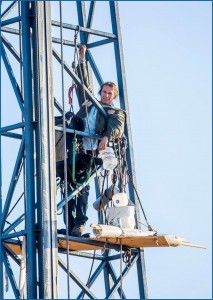 January 22nd From June 20th to July 1st, locally well-known journalist and activist Will Parrish lived 50 feet above ground in a wick drain “stitcher” in the northern Little Lake Valley (ie, Willits Valley) wetlands, where the California Department of Transportation (CalTrans) is building an unnecessary and environmentally destructive freeway bypass.
January 22nd From June 20th to July 1st, locally well-known journalist and activist Will Parrish lived 50 feet above ground in a wick drain “stitcher” in the northern Little Lake Valley (ie, Willits Valley) wetlands, where the California Department of Transportation (CalTrans) is building an unnecessary and environmentally destructive freeway bypass.
By putting his body inside the framework of this destructive equipment, which is in the process of installing roughly 55,000 80-foot drainage tubes into the Little Lake wetlands, Will blocked it from operating and brought
As punishment for Will’s more than 11 day stand on behalf of the Valley’s land and people,
About The Case
When
Under an infraction, the defendant’s case is presided over by a judge rather than a jury. Will was unwilling to accept the uncapped restitution stipulation and was also adamant about his right to receive a jury trial, so his attorney (Omar Figueroa of Sebastopol) asked that Eyster re-file the charges as misdemeanors. Will understood and accepted that the infractions would become misdemeanors, and would include the possibility of jail time, but was not prepared for Eyster’s arbitrary decision to add thirteen additional counts for misdemeanor violations.
Notably, Will already endured a form of house arrest in the wick drain stitcher and was deprived of food, water and medical attention by the CHP (at the behest of CalTrans). The CHP even arrested six people who attempted to bring him supplies. Will went for almost six days with no food, survived partially on rain water, and was bitterly cold after being drenched by more than two days of unseasonal rain.
Why Will Is Pursuing a Jury Trial
This part of the case bears repeating. There is a common misconception that Will is seeking a jury trial because he wants to leverage his case for maximum publicity. This claim has been repeated in numerous media accounts of the case. But it is largely untrue. While Will is indeed interested in maximum publicity for his case, he is exercising his Constitutional right to a jury trial primarily because of DA Eyster’s draconian insistence that he pay criminal restitution to Caltrans.
Will believes a jury trial provides the best opportunity for him to oppose the criminal restitution stipulation.
Will adamantly opposes this harsh criminalization of environmental activism on principal, particularly when the real criminals in this case are those who preside over Caltrans’ Willits Bypass construction. Criminal restitution has not been pursued against direct action protesters in Northern California in recent memory. Thus, the imposition of restitution would also have a chilling effect against future activism. Besides not wanting to be in a position of paying off Caltrans for the rest of his life, Will is dead set against seeing people who stand on their rights to defend the earth from illegal plunder be persecuted for it. He is willing to risk a jail sentence to oppose this dangerous precedent.

 January 22nd From June 20th to July 1st, locally well-known journalist and activist Will Parrish lived 50 feet above ground in a wick drain &l
January 22nd From June 20th to July 1st, locally well-known journalist and activist Will Parrish lived 50 feet above ground in a wick drain &l